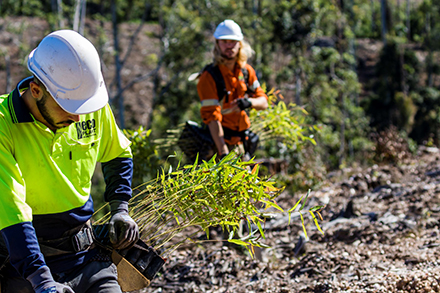North coast NSW’s State forest hardwood plantations will see a flurry of activity this planting season, with a record one million eucalypt seedlings set to be planted. Forestry Corporation had targeted its plantation forests for harvesting over the last 12 months to help keep up with strong demands in the building industry, setting the scene for the record 2021 planting season, said Roading and Plantations Manager, Craig Busby. Source: Timberbiz
“Our increased harvesting focus in north coast plantations has been critical to support the state’s booming housing market,” Mr Busby said.
“For example, we are finalising our replanting program in the Newry plantation forest, following harvesting operations there.
“Timber from this production forest has been essential to the building industry, with many businesses struggling to source adequate timber to build people’s homes.”
On average, more than 1,000 seedlings are hand planted by local crews in every hectare of plantation harvested to regrow forest for the future.
“State forests grow essential structural timber products that are in high demand for everything from the floors and decks in our homes to the power poles, wharf piles and bridges we rely on,” Mr Busby said.
“In a normal year, we plant around half a million eucalypt seedlings in north coast State forest timber plantations, but this year our hardwood plantation replanting program has doubled.
“The increased hardwood replanting program is part of our largest-ever program across the state, as we also replant the fire-affected softwood plantations.
More than 14 million seedlings will be replanted across all State forests this year. Forestry Corporation recently doubled the capacity of the Grafton Nursery to support this bumper replanting program.
“These seedlings are perfectly adapted to local conditions and will rapidly regrow our plantations with high quality timber to ensure a renewable supply into the future,” Mr Busby said.
Timber is the only major building product that stores carbon for the life of the products harvested and has a lower carbon footprint than alternatives such as concrete or steel.
The Intergovernmental Panel on Climate Change recognises that sustainably managed production forests that maintain carbon in growing trees while producing an annual yield of timber deliver a large, sustained climate change mitigation benefit.






